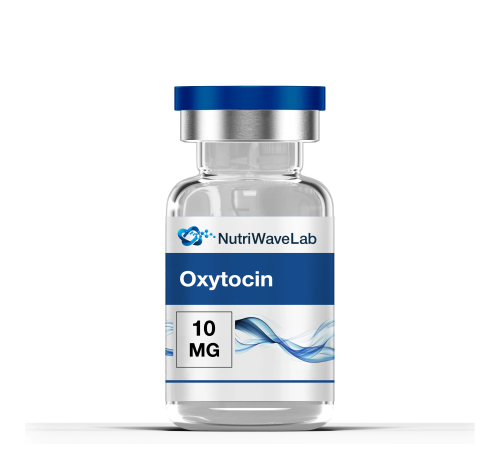
Oxytocin, commonly referred to as the "love hormone," is both a peptide hormone and neurotransmitter with diverse physiological and psychological effects. It is well-known for its role in promoting social bonding, emotional connections, and trust. By influencing mood and reducing anxiety, oxytocin helps foster feelings of happiness, calmness, and psychological stability.
This hormone plays a significant role in reproduction by regulating functions such as sexual arousal, orgasm, and sperm movement in men. In addition to its reproductive effects, oxytocin is associated with lowering stress levels by counteracting the effects of cortisol, the body's primary stress hormone. This calming effect is particularly beneficial during emotionally challenging situations.
Oxytocin also helps enhance social interactions, promoting generosity and trust, which can strengthen relationships and reduce feelings of isolation. While its influence on mood disorders like depression is still under investigation, oxytocin's ability to promote connection and emotional well-being makes it a vital component of overall mental and physical health.
What is Oxytocin?
Oxytocin is a small peptide hormone and neuropeptide, composed of nine amino acids. It is synthesized in the hypothalamus, a key brain region responsible for regulating various bodily processes. Once produced, oxytocin is stored in the posterior pituitary gland, from where it is released into the bloodstream. Besides the brain, oxytocin is also produced in other tissues, including the ovaries and testes.
How Does Oxytocin Work?
Oxytocin operates by binding to specific receptors, known as oxytocin receptors, which are G-protein-coupled receptors found throughout the body and brain. This binding triggers a cascade of cellular responses that affect cell communication and neurotransmitter release. In the brain, oxytocin predominantly influences areas associated with emotions, cognition, and social behaviors.
One of oxytocin’s primary actions is its ability to modulate neurotransmission, which is essential for communication between nerve cells. By regulating neurotransmitter release, oxytocin can impact the strength and function of neural networks, playing a vital role in behaviors such as trust, empathy, and social bonding.
Beyond the central nervous system, oxytocin has important physiological functions, such as regulating cardiovascular health and stress responses. It achieves this by interacting with other hormonal systems and affecting various organs throughout the body.
Oxytocin and Cardiovascular Health
Research indicates that oxytocin has protective effects on the heart. It can reduce the size of heart attacks (myocardial infarction), lower the occurrence of irregular heartbeats (arrhythmias), and enhance heart function during stressful conditions like reduced blood flow to the heart (myocardial ischemia).
Oxytocin also influences the autonomic nervous system, which controls heart rate and contraction strength. It promotes parasympathetic activity, supporting relaxation and reducing the "fight or flight" response, contributing to better cardiovascular stability.
Moreover, oxytocin helps regulate blood vessel function by improving vessel elasticity and promoting vasodilation, which maintains healthy blood pressure. Its anti-inflammatory properties may reduce the risk of cardiovascular diseases like atherosclerosis.
Oxytocin’s stress-reducing effects contribute to lower blood pressure and heart rate variability, preventing long-term damage to the cardiovascular system caused by chronic stress.
Oxytocin and Metabolic Health
Long-acting oxytocin analogs have shown promise in animal studies, demonstrating anti-obesity and anti-diabetic effects. In diet-induced obese mice, oxytocin treatment led to weight loss, better blood sugar control, and improved lipid profiles. It also influenced gene expression linked to fat breakdown and glucose production, while promoting insulin secretion and other metabolic hormones.
Sexual and Reproductive Function
Oxytocin plays a significant role in sexual behavior for both men and women, likely by influencing neural circuits. In men, oxytocin affects penile reflexes and ejaculation through its actions on neurons in the spinal cord. It also has effects on the male reproductive system, including the testes and sperm, where it may contribute to sperm motility and fertility.
Additionally, oxytocin is involved in pair-bonding, social behavior, and reducing stress, all of which may facilitate sexual interactions and reproduction. Intranasal oxytocin spray is currently being studied as a potential treatment for sexual dysfunction, although results have been mixed so far.
Oxytocin Overview
- Molecular Formula: C₄₃H₆₆N₁₂O₁₂S₂
- Molecular Weight: 1007.2 g/mol
- PubChem CID: 439302
- Synonyms: Oxytocin, Pitocin, Endopituitrina, Ocytocin (CAS Number: 50-56-6)
Research Applications
- Cardiovascular Protection
- Metabolic Health
- Sexual and Reproductive Function
Product Use: THIS PRODUCT IS STRICTLY FOR SCIENTIFIC RESEARCH PURPOSES ONLY. It should only be used in laboratory settings. All product information on this website is provided solely for educational purposes. The law strictly prohibits introducing this product into the body of humans or animals. Only licensed professionals should handle this product. This product is not a drug, food, or cosmetic and should not be improperly classified or used as such.
There are no reviews for this product.
No questions about this product.
